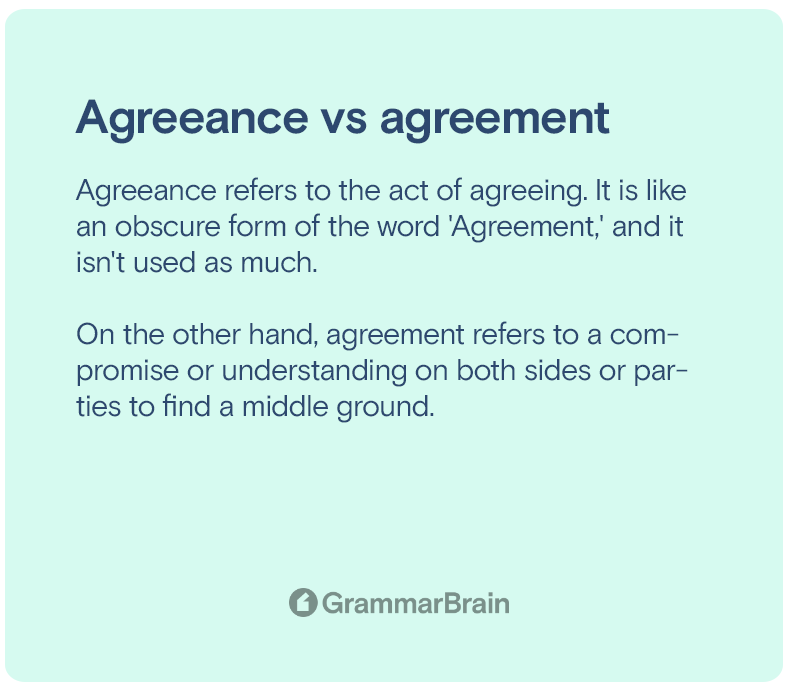Is it agreeance or agreement? It’s perfectly normal to be confused between similar words. There are a ton of English words that look similar, and we don’t blame you for that. Agreeance and agreement fall under that category.
Let’s break them down for you today in this article:
Agreeance vs. Agreement – Meanings & Difference
Agreeance refers to the act of agreeing. It is like an obscure form of the word ‘Agreement,’ and it isn’t used as much.
On the other hand, agreement refers to a compromise or understanding on both sides or parties to find a middle ground. Things should be harmonious, and contradiction shouldn’t be present to be an agreement.
Here’s where the difference lies:
- Agreeance consists of a state where the two sides share an opinion or view.
- Agreement is a state of mutual understanding between parties or entities in following a particular course of conduct.
Agreeance vs. Agreement – Sentence Examples
Now, let us put these words into sentences for you to better understand them.
Agreeance
- Both the defendant nor the plaintiff didn’t come to an agreeance about the money. Hence, they decided to take it to the court.
- Cady and Regina failed to have a mutual agreeance on the math problem. Both of them tried eagerly to prove that they were right.
- The parents had a mutual understanding and agreeance. So, they chose to go ahead with an uncontested divorce.
- It is no secret that the level of human agreeance is entirely non-existent nowadays.
- We can spend an entire day talking about this matter but coming to an agreeance is impossible.
- Agreeance isn’t as widely used as the word ‘Agreement’ is.
Agreement
- We came into a mutual agreement that it’s best to leave the family out of this matter.
- Bill signed an agreement to purchase the $2 million property.
- You have to come to an agreement with the terms and conditions of this contract.
- Everyone in the group has come to an agreement in choosing Rick as the scout leader.
- Lily and I have come to an agreement on just having 2 children for the rest of our lives.
- They nodded in agreement. It was then I realized that I was a goner.
- We need to come to a final agreement on the price.
- I will never be in an agreement with their suspicious terms.
- It’s impossible to come to an agreement with her.
- She reluctantly entertained the agreement concerning her new job role.
- I declined the offer because the agreement mostly favored them and their agendas.
Is Agreeance or Agreement More Acceptable?
Yes, the use of the word ‘Agreeance’ is increasing a lot in modern speech and text. But the word ‘Agreement’ is more acceptable since it’s used heavily in the English language.
The average person will naturally shift towards using ‘Agreement’ in their daily life. You have to understand that ‘Agreeance’ possesses a more obscure usage, making it suitable for specialized texts.

Conclusion
To conclude, both agreeance and agreement are okay to use. You aren’t committing a crime if you use one over the other.
However, agreement is widespread in contemporary English and more acceptable to use. When you do use agreeance, just make sure you don’t insert an ‘In’ before the word.
It will sound incorrect. Congratulations! you can finally identify the difference between the two and make proper judgments.
Inside this article
Fact checked:
Content is rigorously reviewed by a team of qualified and experienced fact checkers. Fact checkers review articles for factual accuracy, relevance, and timeliness. Learn more.
Core lessons
Glossary
- Abstract Noun
- Accusative Case
- Anecdote
- Antonym
- Active Sentence
- Adverb
- Adjective
- Allegory
- Alliteration
- Adjective Clause
- Adjective Phrase
- Ampersand
- Anastrophe
- Adverbial Clause
- Appositive Phrase
- Clause
- Compound Adjective
- Complex Sentence
- Compound Words
- Compound Predicate
- Common Noun
- Comparative Adjective
- Comparative and Superlative
- Compound Noun
- Compound Subject
- Compound Sentence
- Copular Verb
- Collective Noun
- Colloquialism
- Conciseness
- Consonance
- Conditional
- Concrete Noun
- Conjunction
- Conjugation
- Conditional Sentence
- Comma Splice
- Correlative Conjunction
- Coordinating Conjunction
- Coordinate Adjective
- Cumulative Adjective
- Dative Case
- Determiner
- Declarative Sentence
- Declarative Statement
- Direct Object Pronoun
- Direct Object
- Diction
- Diphthong
- Dangling Modifier
- Demonstrative Pronoun
- Demonstrative Adjective
- Direct Characterization
- Definite Article
- Doublespeak
- False Dilemma Fallacy
- Future Perfect Progressive
- Future Simple
- Future Perfect Continuous
- Future Perfect
- First Conditional
- Irregular Adjective
- Irregular Verb
- Imperative Sentence
- Indefinite Article
- Intransitive Verb
- Introductory Phrase
- Indefinite Pronoun
- Indirect Characterization
- Interrogative Sentence
- Intensive Pronoun
- Inanimate Object
- Indefinite Tense
- Infinitive Phrase
- Interjection
- Intensifier
- Infinitive
- Indicative Mood
- Participle
- Parallelism
- Prepositional Phrase
- Past Simple Tense
- Past Continuous Tense
- Past Perfect Tense
- Past Progressive Tense
- Present Simple Tense
- Present Perfect Tense
- Personal Pronoun
- Personification
- Persuasive Writing
- Parallel Structure
- Phrasal Verb
- Predicate Adjective
- Predicate Nominative
- Phonetic Language
- Plural Noun
- Punctuation
- Punctuation Marks
- Preposition
- Preposition of Place
- Parts of Speech
- Possessive Adjective
- Possessive Determiner
- Possessive Case
- Possessive Noun
- Proper Adjective
- Proper Noun
- Present Participle
- Prefix
- Predicate



